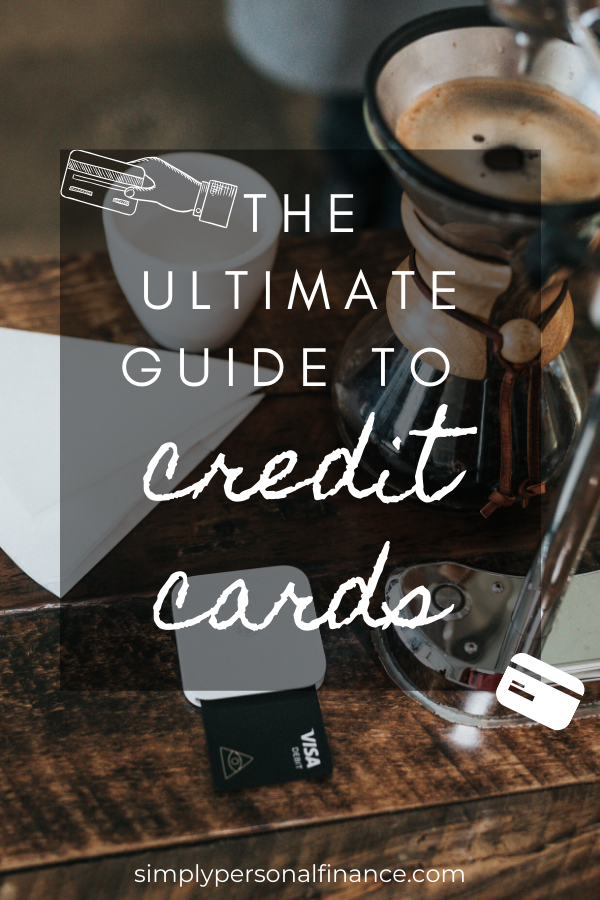Credit cards are amazing tools to use in your everyday life, but only when they’re used correctly.
In this article I’m going to walk you through the good, the bad, and just overall what you should be thinking about when looking for a new credit card and/or re-evaluating your current situation. I personally love using credit cards but many people have completely sworn off of them.
Having a credit limit of $10,000 does not mean you have $10,000. Credit is not free money! When you spend $5 on a credit card, you need to pay that $5 back by a certain date. If you don’t, the credit company is going to charge you interest for every month that you don’t pay it back. I pay my credit card off in full every month and anyone you talk to will tell you to do the same.
I love using credit cards firstly, because it allows me to keep a digital track of all of my purchases without rummaging through receipts. But, credit cards also come with some pretty nifty perks if you’re looking in the right place.
P.S. This is not a sponsored post, I will simply be sharing what credit cards I have and for what reasons.
Let’s get into it!
Rewards
As soon as I turned 19, I signed up for my first student credit card. I got the Scotiabank Scene Visa card and set a $1,000 limit because that was like a million dollars to me at that point. There was no annual fee and I would get one Scene point for every dollar spent ultimately leading to a free movie ticket! As a student this was perfect.
Then I graduated and started a real job… Soon enough, the $1,000 limit was simply not realistic in my day to day life and the free movie was definitely not the best reward for me at that point.
Some of the options for rewards you can be on the look out for are:
1. Cash Back
Cash back rewards are exactly what they sound like, you get cash back to shop!
As an example, my Scotiabank Momentum Visa card offers 2% cash back when I shop at grocery stores, gas stations, drug stores and when I charge recurring bills on the card. The card then offers 1% cash back when shopping anywhere else.
This was the first card I signed up for after the Scene Visa card since I figured at this point in my life, getting cash was more valuable to me than getting a free movie ticket. Last year I received over $150 back just for shopping as I normally would.
2. Rewards Points
There are other cards to choose from that will give you more specific rewards points.
I also have the Scotiabank Gold American Express card, which gives me 5 ScotiaRewards points for every dollar spent at restaurants, grocery stores & on eligible entertainment, 3 points for gas, transit, rideshares & streaming services (like Netflix!), and then 1 point on everything else.
I can use those points to buy products on the ScotiaRewards site like phone cases, headphones, computers etc. OR I can convert them back into Scene points for free movies (lol) OR I can put it towards travel!
3.Travel Points
Travel points are usually where you will get your most bang for your buck. Some credit cards will give you points towards frequent flyer miles or some specific rewards points system to use towards travel related purchases.
With my Scotiabank Gold Amex card, I can put the points directly towards travel. So, I can shop through the ScotiaRewards site and use the points directly to book the flight, train ticket, anything travel related. I also have the option to pay for the flight, train, whatever it is I just have to be using the Amex card and then I can actually redeem the points for those travel related purchases for up to a year!
So when I purchased my roundtrip flights to Europe it cost me just over $1,000. Right now I only have about 45,000 points but I could redeem those points today for $450 towards the flight I purchased in January!
When looking for a credit card, make sure to pick the rewards points that best suit your lifestyle. You can’t really go wrong with cashback cards and if you don’t want to have to deal with any sort of point collecting then this might be your best bet!
For me personally, I use both a cashback and a travel card and I actually use different cards to pay for different things. I almost always try to use my Scotiabank Gold Amex card wherever I go but I will use my Visa Momentum at the pharmacy/drug stores and anytime that Amex isn’t accepted (which is honestly quite often).
If you’re on the fence about which rewards style might suit you best, check out ratehub.ca and compare cards based on your spending.
Annual Fees
Don’t be afraid of annual fees! If you are using your card regularly for everyday life, the value you get from rewards will almost always outweigh the price you pay in an annual fee. You should be choosing a card that will fit with your personal spending categories.
My Visa Momentum card has an annual fee of $39 and my Gold Amex card has an annual fee of $120. However, I specifically picked these cards because the fees would pay for themselves many times over and the cards would give me better features than others with no annual fee.
Again, I definitely recommend you check out ratehub.ca to see what might work best for you!
Foreign Exchanges
If you travel frequently or buy products in other currencies, you definitely need to take foreign exchange rates into consideration when looking at credit cards.
Usually credit cards will charge you a 2.5% fee when you are spending money in another country and currency. So if you travel to Europe and spend $100, you’ll also pay $2.50 in fees. Or if you’re Canadian like me and buy something online in US dollars, the same 2.5% fees will apply there. Over time, this can really add up.
But there’s good news! There are many credit cards available with 0% foreign exchange fees, you just have to find them. This means that you will only be charged the current exchange rate between your currency and the currency you are spending in with no extra fees tacked on.
My Scotiabank Gold Amex card offers me 0% on foreign exchanges so I buy all of my US online purchases on this card. Also when I was in Europe earlier this year, I tried to pay for everything on my Amex card or I would pay cash.
The only problem is that not everywhere accepts American Express cards… So, I am also looking into getting the HomeTrust Visa Preferred specifically for travelling purposes as Visa is a more widely accepted creditor, the card offers 1% cash back on eligible purchases and it has no annual fee to worry about. Another great option is the Scotiabank Passport Visa, however, there is a $120 annual fee for this one.
Safety & Insurance
When looking to sign up for a credit card, be sure to look at the insurance features!
When I purchase items with my Visa Momentum card, it gives me purchase protection against damage, theft and loss for 3 months. It also doubles whatever the manufacturer’s warranty is for up to one year. The same goes for my Amex card.
Additionally with my Amex card, I am automatically covered for 25 days of medical insurance up to $1 million dollars if I am travelling outside my province in Canada. If I pay for my flights and travel related expenses using the card I also have trip cancellation insurance, flight delay insurance, delayed and lost baggage insurance and car rental insurance. That $120 annual fee is looking pretty good now isn’t it…
Additional Features
In addition to all the rewards I’ve already mentioned, yes some credit cards have even more features to offer you!
My Visa Momentum card gives me a discount on car rentals and my Gold Amex card gives me a discount on airport lounges. Some cards will offer you free lounge passes and other perks, you’ll simply need to take the time to apply.
The Gold Amex card also offers me front of the line pre-sale tickets to most concerts and theatre productions. If you know me, you know that I looove spending money on concerts!
So what’s the moral of the story in this section? Next time you get a pamphlet in the mail with your credit card, READ IT! There might be some cool features that you could definitely take advantage of.
Sign Up Bonuses
Sign up bonuses are most common with travel rewards cards, but if you’re on the fence between two similar cards, this could be a great tie breaker.
When I signed up for my Amex card, I received 20,000 Scotia Rewards points for spending $1,000 within the first 3 months. Based on my spending at that point, I was definitely spending $1,000 well within that time period and those 20,000 points are equivalent to $200. That signup bonus already offset the $120 annual fee within the first 3 months.
Sign up bonuses are something to be aware of but shouldn’t be the main deciding factor on which credit card will work best for you.
Building Credit
When you spend money on a credit card and pay it back on time, you’re building a good credit score. Your credit score is a score between 300-850/900 and when you pay your credit card off in full every month it shows the creditors that you are a trustworthy lender. This good habit, among many other things, will lead you to build a higher credit score. Yay!
You want to give lenders every reason to lend you money in the future and you want to show that you pay back your credit in a timely manner.
Did you notice how I didn’t mention how I use my Scotia Scene Visa card? I don’t use it for anything specific anymore but I do make random purchases every few months like when I use the tap system to get onto public transit or I’ll use it to pay for something random like popcorn at the movie theatre.
I do not want to cancel that card because it is the card I have had the longest and it actually helps my credit score by having it. I do need to continue to use it every so often or I may be flagged as “inactive” and this might hurt my credit score by decreasing my credit timeline history.
Building a good credit report now will help you in the future when you want to apply for a mortgage or other larger loans. But don’t think you’re off the hook as a renter! Many landlords will also request credit reports to ensure you are a trustworthy renter who has a history of paying their bills on time!
When Not To Use A Credit Card
At the end of the day, you don’t want to be making unnecessary purchases just because you get a reward back for doing so. Credit card rewards should only be considered a bonus to your regular expenses.
Lots of people have completely cut out the use of credit cards in their lives because they recognize their cycle of unhealthy spending habits. Credit cards are not the devil, ultimately it comes down to the person swiping the card.
Remember, when you use a credit card, this is not free money. You are borrowing money from a company like Visa, Mastercard or American Express and you are expected to pay it back. If you don’t pay it back on time, most creditors in Canada will charge between between 20-30% annually and bill you every month until you pay it back. Yes, it’s insane but it is what it is.
Abusing credit cards can lead to consumer debt resulting in a low credit score and even bankruptcy in a worst case scenario.
If you tend to spend more than you make or if you have a tendency to impulse buy, credit cards might not be the best option for you. Work on your money mindset before taking the plunge. I encourage you to download my budget template and check out my post How To Start Budgeting.
What If I Already Have Credit Card Debt?
Now, while I and anyone you talk to will always recommend paying off your credit card in FULL every month, these are desperate times…
1. Talk to your bank
Right now, many financial institutions and credit companies are cutting interest rates on credit cards on a case by case basis.
If you cannot pay your credit card bill right now, talk to your bank to see if you qualify for deferred payments and/or a lower interest rate. For reference, Vancity has cut credit card interest down to 0% and are deferring payments for those who are eligible. You’ll never know if you don’t ask!
2. Find a 0% interest balance transfer card
If you can’t get an interest cut or payment deferrals, some credit cards will allow you to transfer a current balance and charge a 0% interest rate for a year.
So let’s say you have $5,000 on one card that will charge you a 19.99% annual interest. If you keep that $5,000 debt with that creditor, at the end of the year you’ll also rack up another $999.50 of debt to pay back just from the interest.
However, if you were to transfer the $5,000 to a card offering you a one year 0% interest rate, you might be charged a balance transfer fee of $150 (usually around 1-3% of the balance) but you’ll be saving around $850 of interest! Every dollar counts right now, then make a plan to pay off that full balance during the promotional period. Sometimes the interest will jump even higher than the 19.99% you had originally after the promotional period. Do your research!
Final Thoughts
Know that every time you apply for credit, it will negatively impact your credit score for a short period of time. You don’t want to be applying for too much credit, only when you need it. Be especially cautious if you are going to be applying for a mortgage or some other larger loan in the near future.
Lastly, you might notice your credit card showing a minimum payment of around $10 for each statement. If you only pay this minimum amount, you will be charged interest on the remaining amount. Aim to pay your balance in FULL every month, that means owing $0 at the end of each pay period.
Again, I personally love using credit cards for my everyday purchases but at the end of the day, credit card rewards are not going to be your main route to wealth. If you choose to use credit cards, you need to be responsible and stay on top of what you owe each and every month.
“Too many people spend money they haven’t earned, to buy things they don’t want, to impress people that they don’t like.”
Disclaimer: I am not a certified financial planner or investment advisor. The ideas posted on this website are my own opinions on how I manage my personal finances. The content is specifically for educational and informational purposes and is not considered professional financial advice.
Related Articles
How I Use My High Interest Savings Account
Self Isolating? Free Things You Can Do From Home
Pin it for later!









Leave a Reply